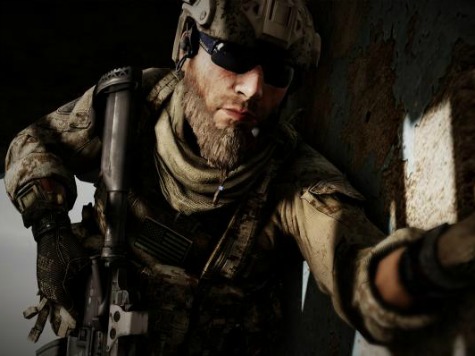When I wrote my review for Medal of Honor: Warfighter, I was acutely aware that my opinion of the game was not shared by the majority of the gaming press. What’s troubling is that the scorn for Warfighter seems to have little to do with the actual quality of the game’s content.
Warfighter currently holds a 55 out of 100 average score for the PC version on review aggregator Metacritic. That score is abysmal for a triple-A, major studio release. Reading the actual reviews, however, it seems that many critics appear to have less to say about the quality of the game and are more concerned with Warfighter‘s message and its place in the industry among other FPS juggernauts.
GameTrailers calls Warfighter “a brazenly patriotic action movie married to a third-rate soap opera,” while Game Informer sneers that “a jingoistic narrative derail[s] the experience.” Author Matt Bertz laments that while men who have actually seen combat wrote the game, “rather than give us insight into moral, emotional, and physical tolls combat takes on soldiers and their families, the game falls back on heavy-handed tropes that paint war in the most simplistic hues.”
“The central story comes by way of the jargon-filled military chatter you’re used to in such games,” complains Kevin VanOrd of Gamespot, “in which you know who the bad guy is, not because wrongdoing is demonstrated, but because the characters say he’s the bad guy.”
Jim Sterling of Destructoid calls the game “a tacky and melodramatic look at military life with a script that could have been trotted out by a twelve-year-old,” complete with “enemies who are one scream of ‘Durka Durka’ away from becoming Team America stereotypes.”
Unsurprisingly, Eurogamer holds the game in absolute contempt for its positive portrayal of American soldiers and the sacrifices they make, claiming, “the game’s queasy paean to American superiority in the face of irrational foreign savagery is horribly misplaced. If it were any more competent, the tub-thumping jingoism might be offensive rather than simply tragic.”
British paper The Guardian finds the tone insincere: “dressing this up in the way that Warfighter’s developer and publisher do, as a tribute to the armed forces and the sacrifices of war, seems a kind of huckster’s valorisation.” Author Rich Stanton goes even further, asserting anyone who agrees with the story’s tone has been “fooled”:
When you pretend to be saying something about ongoing real-world wars, but present a conflict of extremes with all the substance of air, the thought that anyone might take Warfighter seriously becomes a very queasy one. What it comes down to is an assumption that its audience is there to be fooled, and doesn’t care anyway. That’s what Warfighter feels like – a piece of propaganda.
In addition to being appalled by Warfighter’s reverence for the American Special Forces community, reviewers seem to believe that there’s no need for any other military first-person shooter than the one that’s dominated the market for the past six years, Call of Duty. Despite being significantly different from that franchise in both tone and design, many reviews boil down to the conclusion that Warfighter is a competent shooter that doesn’t necessarily do anything wrong, but why would you buy it when Call of Duty exists?
The irony seems lost on critics that this year’s installment of Activision’s money-printing machine, Call of Duty: Black Ops II, has yet to be released, making any truly objective comparison of the two games impossible. The assumption here is that Black Ops II will undoubtedly be every bit as incredible as these same writers have been told it will be by the publisher’s PR team, despite criticism from the gaming community that the Call of Duty brand has stagnated due to its release of yearly iterations that do little to differentiate themselves from each other.
It’s important to note that the gaming press has a history of mocking games that are positive in their treatment of the US Military. When Medal of Honor was released in 2010, Metro GameCentral (a UK outlet) claimed “its cowardly pretence at topicality is genuinely disturbing, with its implication that taking part in the conflict would be fun if only you had infinite respawns,” in regards to the game being based on events in the War in Afghanistan.
Conversely, 2K Game’s Spec Ops: The Line, which was released earlier this year, was praised for its story that saw players assume the role of an American soldier fighting against fellow Americans who had gone rogue in a disaster-stricken Dubai and were committing atrocities. G4 TV called the game “highly provocative and cerebral,” while the Penny Arcade Report praised Spec Ops for “ditch[ing] faux-heroism for a harrowing look at how war makes villains of everyone.”
Ben Kuchera wrote:
Most war games sell the comforting lie that American soldiers are something close to gods, and everything they do is just and right. The Calls of Duty and Medals of Honor of the world tell us there is no higher calling than draping yourself in an American flag before going around the world to kill as many people as you can.
Kuchera praised Walt Williams, Spec Ops‘s writer, for his portrayal of wars and the men who fight them. Williams, as far as can be determined by his personal blog page, has no military background, yet his view of what war is really like was lauded as realistic and gripping, while Warfighter‘s story, written by active duty and retired service members, is derided as melodramatic, jingoistic pap.
There are legitimate criticisms of Warfighter that can and have been made, even though I thoroughly enjoyed my time with it. But it appears many reviewers’ scores couldn’t get past the game’s mortal sin of unequivocal praise for American soldiers.
Photo credit: Electronic Arts, Inc.

COMMENTS
Please let us know if you're having issues with commenting.